
EU Commission Report Launch/Roundtable
Welcome – Professor Brian MacCraith, President, DCU
Launch - Petra Goran, European Commission, Directorate General for Education and Culture and Minister Katherine Zappone, Minister for Children and Youth Affairs of the report, Structural Indicators for Inclusive Systems in and around Schools (2017). Downes, P., Nairz-Wirth, E. & Rusinaite, V. Luxembourg: Publications Office of the European Union
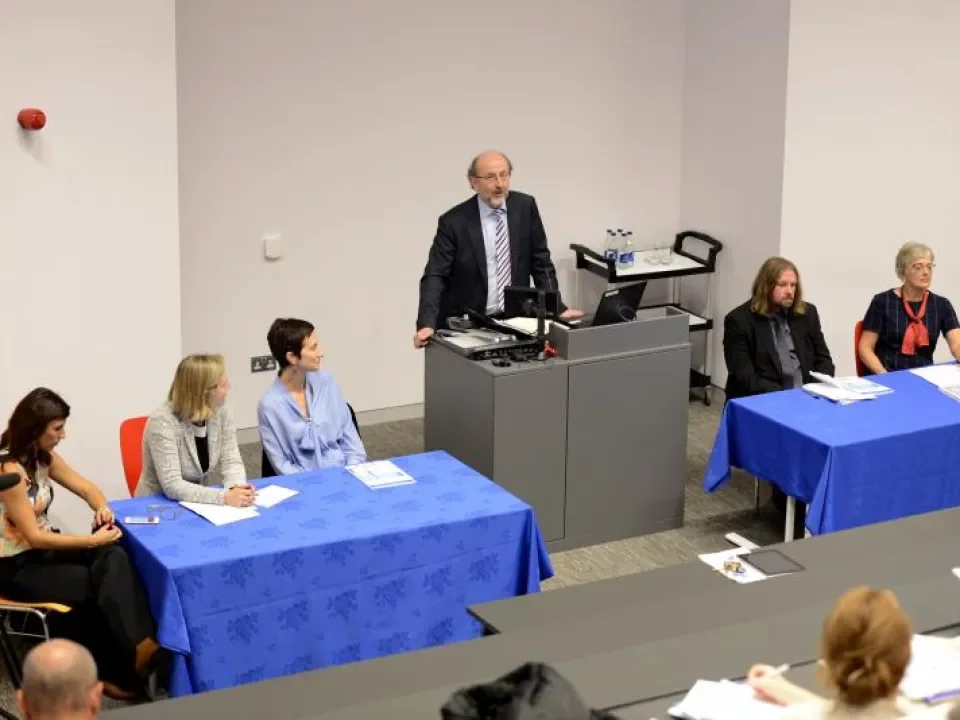
Educational Disadvantage Centre, 20th September 2017
Professor Brian Mac Craith giving the opening address
Petra Goran, European Commission, Directorate General for Education and Culture
Minister Katherine Zappone, Minister for Children and Youth Affairs
Dr Irene Psifidou, Cedefop, Presentation on the new Structural Indicators Self-Reflection Toolkit for Preventing Early Leaving from Vocational Education and Training led by Paul Downes
Dr Paul Downes, Director, Educational Disadvantage Centre, Associate Professor of Education (Psychology), DCU
Professor Erna Nairz-Wirth, Vienna
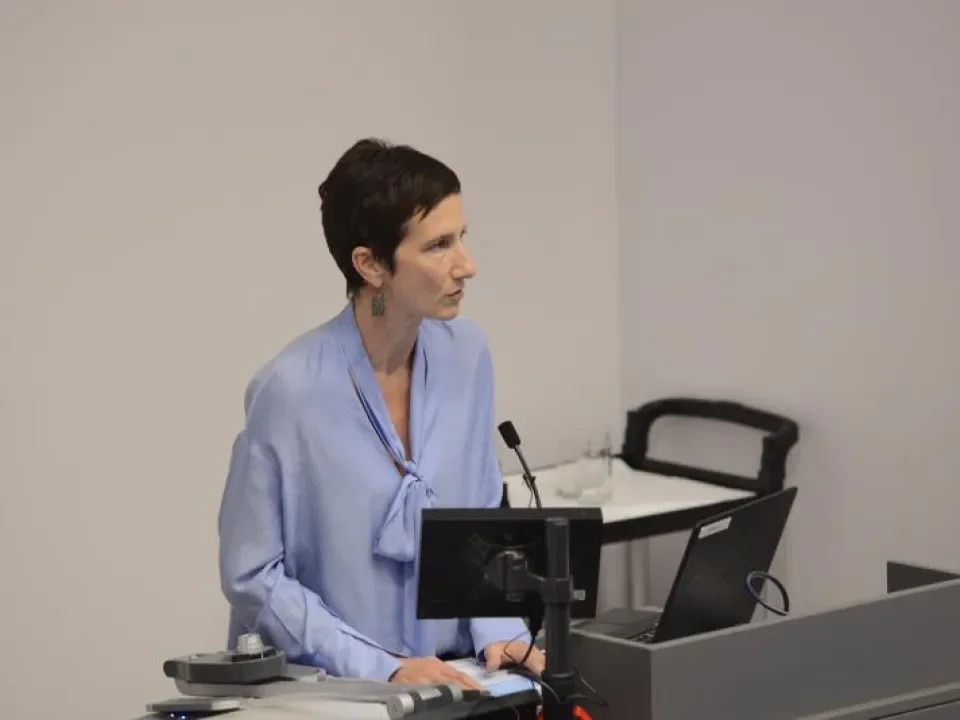
Educational Disadvantage Centre, DCU 20th September 2017
Petra Goran, European Commission, Directorate General for Education and Culture
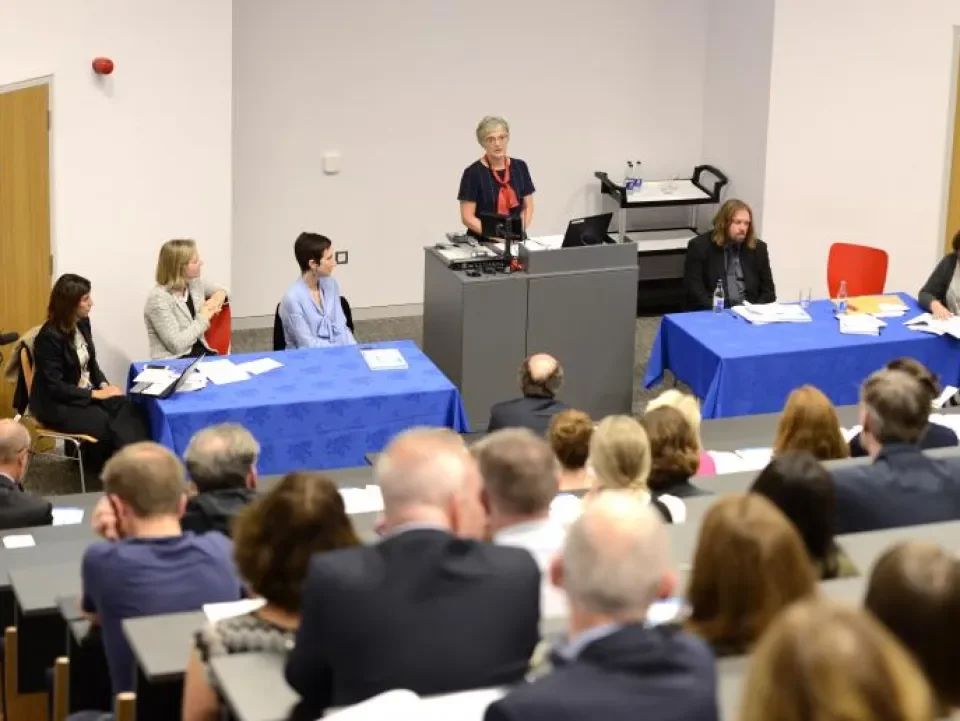
Educational Disadvantage Centre, DCU 20th September 2017
Minister Katherine Zappone
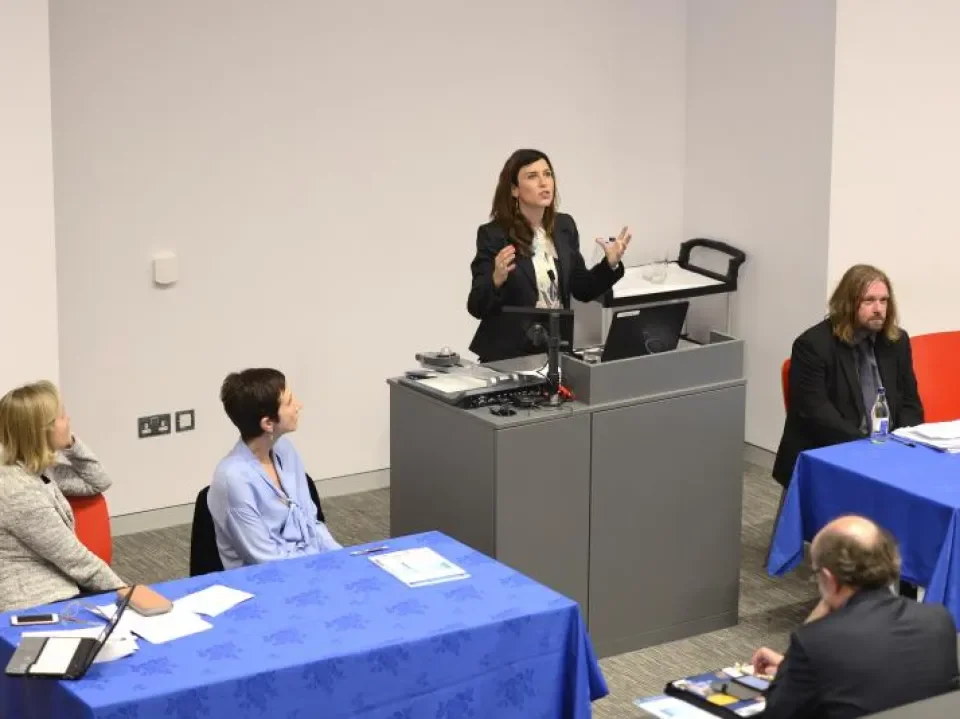
Educational Disadvantage Centre, DCU, 20th September 2017
Dr. Irene Psifidou, Expert Learning and Employability, CEDEFOP
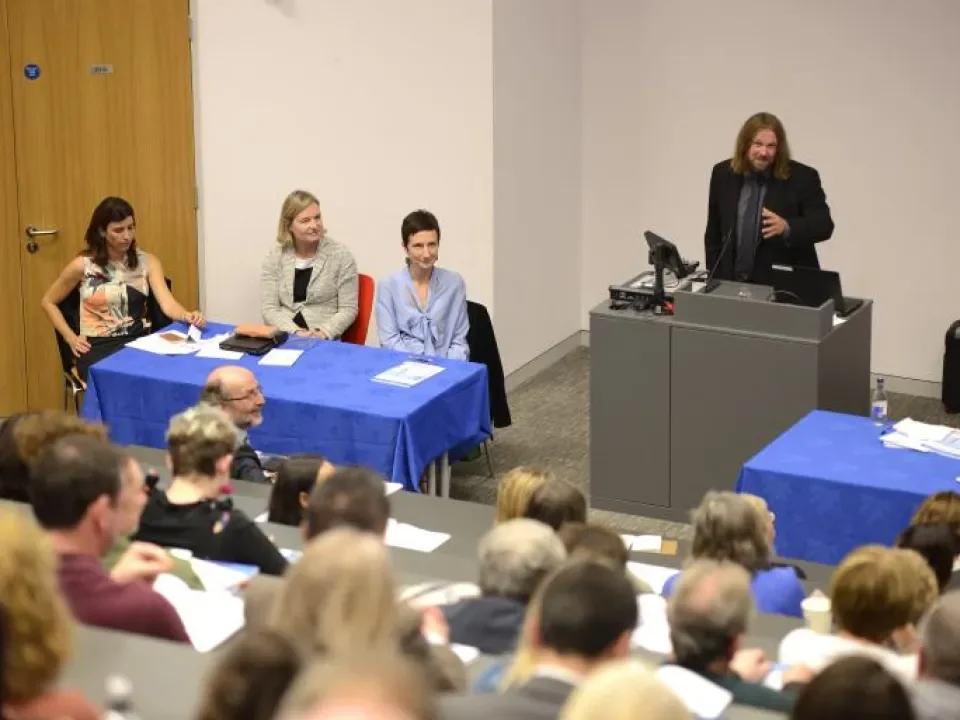
Educational Disadvantage Centre, DCU, 20th September 2017
Dr Paul Downes, Director, Educational Disadvantage Centre, DCU
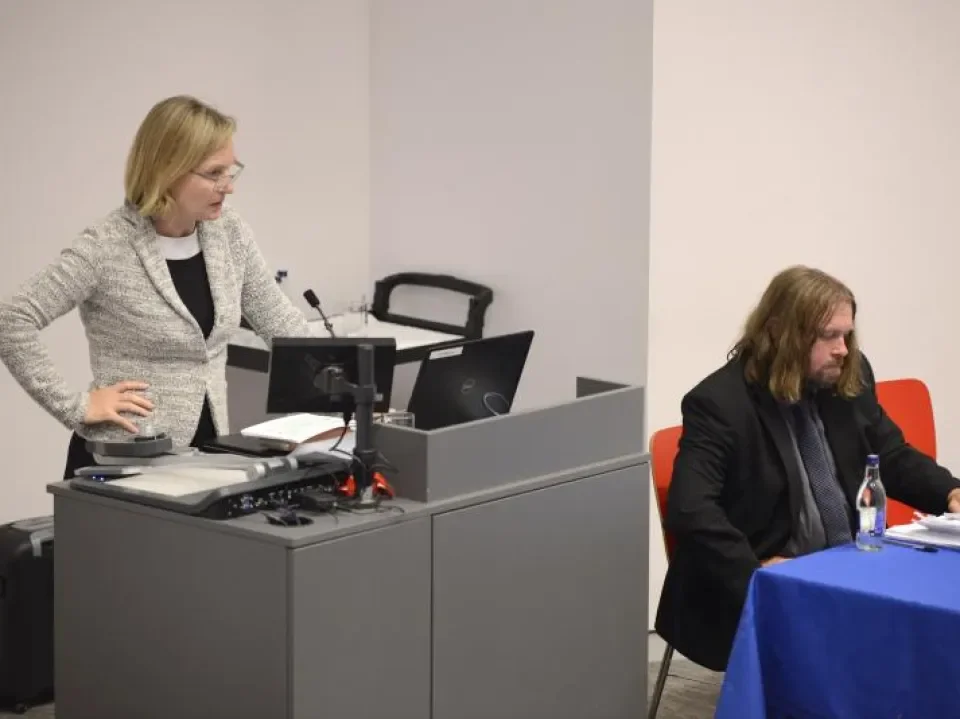
Educational Disadvantage Centre, DCU, 20th September 2017
Professor Erna Nairz-Wirth, Head of Educational Sciences Group, Vienna University of Economics and Business .
Minister Zappone, European Commission and Cedefop join DCU Educational Disadvantage Centre to launch report on inclusive systems in and around schools
Access a video of the launch here
Dr Katherine Zappone, Minister for Children and Youth Affairs, joined Dublin City University last night to launch a DCU-led report published by the European Commission on the development of a new tool to analyse the inclusiveness of education systems.
International research indicates that school systems need to change in order to tackle early school leaving and improve social inclusion in education and society. However, policy-makers and school actors require practical tools to assist them in this process.
Led by Dr Paul Downes, Director of the Educational Disadvantage Centre, Institute of Education at Dublin City University, this report develops such practical tools by translating international research findings, as well as EU policy and legal documents, into user-friendly proposals to guide strategic reform of policy and practice. It offers a reconceptualization of systemic approaches to supports setting out key fundamental principles for inclusive systems.
DCU President, Professor Brian MacCraith welcomed the launch attendees and Dr Anne Looney, Executive Dean, Institute of Education, DCU introduced each of the speakers.
Key speakers, Petra Goran, European Commission, Irene Psifidou, Cedefop and Professor Erna Nairz-Wirth, Vienna spoke about how promoting inclusive systems can help address major issues of societal importance in the education system, including early school leaving prevention, mental health supports for vulnerable students, school bullying and violence prevention, and a positive learning environment to foster student learning and leadership.
Irene Psifidou also presented on another structural indicators tool focusing specifically on early leaving from vocational education and training, a tool developed by Paul Downes and published by Cedefop.
Minister Zappone welcomed the report and commended the team involved in putting it together, adding that it reinforced the idea that schools can’t achieve this by themselves and that we all have such a key role to play. She committed to exploring ways to disseminate and implement aspects of the report, in Irish and wider contexts.
Dr Paul Downes, Associate Professor of Education (Psychology) and Director of the Educational Disadvantage Centre, DCU, put this report in context for Ireland:
“Child poverty in Ireland increased at the fastest rate in the EU between 2008 and 2011, with Latvia, Bulgaria and Hungary our nearest rivals for this unwanted title. In Ireland it has continued to increase every year until 2015. In other words, children and young people have borne the brunt of the economic crisis. We now need an overarching and not piecemeal response to child poverty at a national level, centrally including improved provision of services”.
Two key services emphasised in the report Structural Indicators for Inclusive Systems in and around School are multidisciplinary teams in and around schools and community based lifelong learning centres:
“We need to combine these services into community based one-stop-shops to end service fragmentation and to provide young people and their parents with continuity and flexibility of tailored supports, including drop-in services rather than merely a few pre-packaged programmes.
We need a national strategy for community based integrated centres, combining lifelong learning and multidisciplinary team supports, and linked with schools. Multidisciplinary teams linked with schools are a hallmark of good practice in a European context and taken for granted as a service provision in many EU countries – but not Ireland.”

Structural Indicators for Developing Inclusive Systems in and Around Schools in Europe
Downes, P., Nairz-Wirth, E., Rusinaite, V. (2017). Structural Indicators for Developing Inclusive Systems in and around Schools in Europe. Luxembourg: Publications Office of the European Union/EU bookshop, can be accessed HERE
CEDEFOP SELF-REFLECTION TOOL FOR POLICY MAKERS TO TACKLE EARLY LEAVING FROM VET - Access Self-Reflection Tool here
The development of the toolkit was developed by Paul Downes, Dublin City University under Cedefop’s framework contract 2013-FWC25/AO/ECVL/IPS-ARANl/EarlyLeaving/OO5/13 and the responsibility of Irene Psifidou, Cedefop expert at the Department for learning and employability, headed by Antonio Ranieri.
STRUCTURAL INDICATORS BASED SELF-REFLECTION TOOL FOR POLICY MAKERS TO TACKLE EARLY LEAVING FROM VET - Access PowerPoint Presentation here
Dr. Irene Psifidou, Expert Learning and employability, CEDEFOP
Educational Disadvantage Centre, DCU, 20th September 2017
DCU LAUNCH OF REPORT ON INCLUSIVE SYSTEMS PUBLISHED BY THE EUROPEAN COMMISSION - Access PowerPoint Presentation here
Professor Erna Nairz-Wirth,Head of Educational Sciences Group, Vienna University of Economics and Business .
Educational Disadvantage Centre, DCU, 20th September 2017
ROUNDTABLE ON A 'ONE STOP SHOP' COMBINING COMMUNITY BASED MULTIDISCIPLINARY TEAMS WITH COMMUNITY LIFELONG LEARNING CENTRES
Earlier in the day, September 20th, 2017, the Educational Disadvantage hosted a Roundtable in Belvedere House, Institute of Education, St. Patrick’s Campus, DCU to discuss the theme of a 'One Stop Shop' Combining Community Based Multidisciplinary Teams with Community Lifelong Learning Centres. Two basic questions were explored:
1. Is there a need to develop models of community based ‘One stop shops' that combine community based multidisciplinary teams with community based lifelong learning centres ?
2. Can we develop an Irish national strategy for these and an EU led strategy ?
The group was welcomed by Dr Anne Looney, Dean of Education, DCU Institute of Education. Dr Paul Downes, Director, DCU Educational Disadvantage Centre, outlined the two basic questions and an initial rationale for the discussion. Presentations were then given by Petra Goran, European Commission, on the European Policy Context for these issues, by Irene Psifidou, Cedefop on the Response of Cedefop to Community Outreach One Stop Shops and by Dr Siobhan O'Reilly, Executive Director, Familibase, Ballyfermot, Key Advantages of Community Based Multidisciplinary Teams
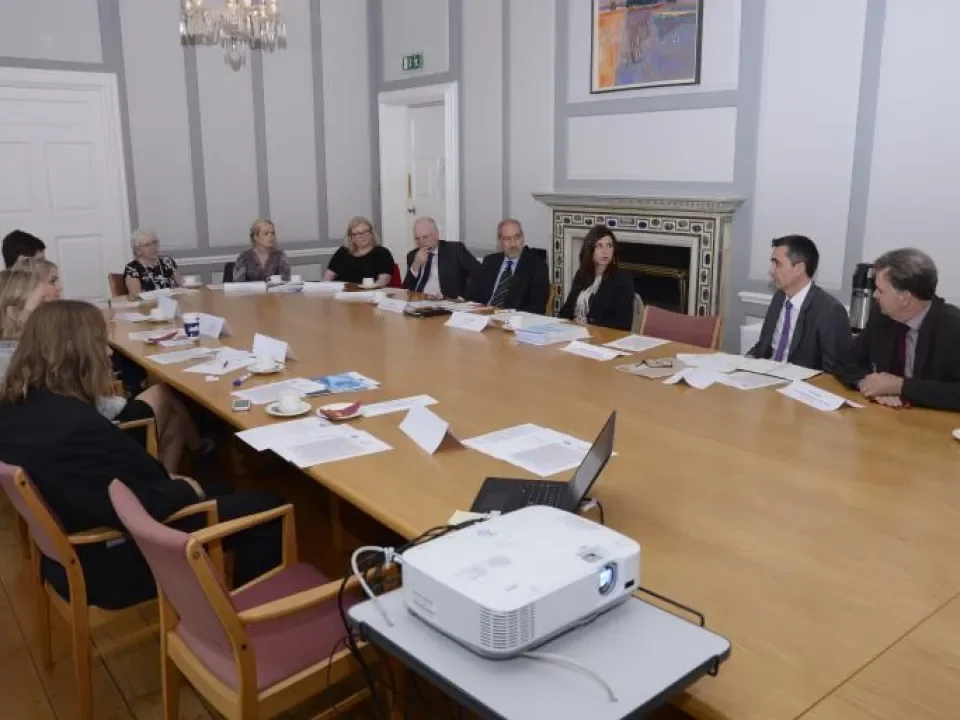
Roundtable 'One Stop Shop'
Dr. Irene Psifidou, Expert Learning and Employability, CEDEFOP.
Access Dr Psifidou's PowerPoint Presentation here
Dr Siobhan O'Reilly, Executive Director, Familibase, Ballyfermot
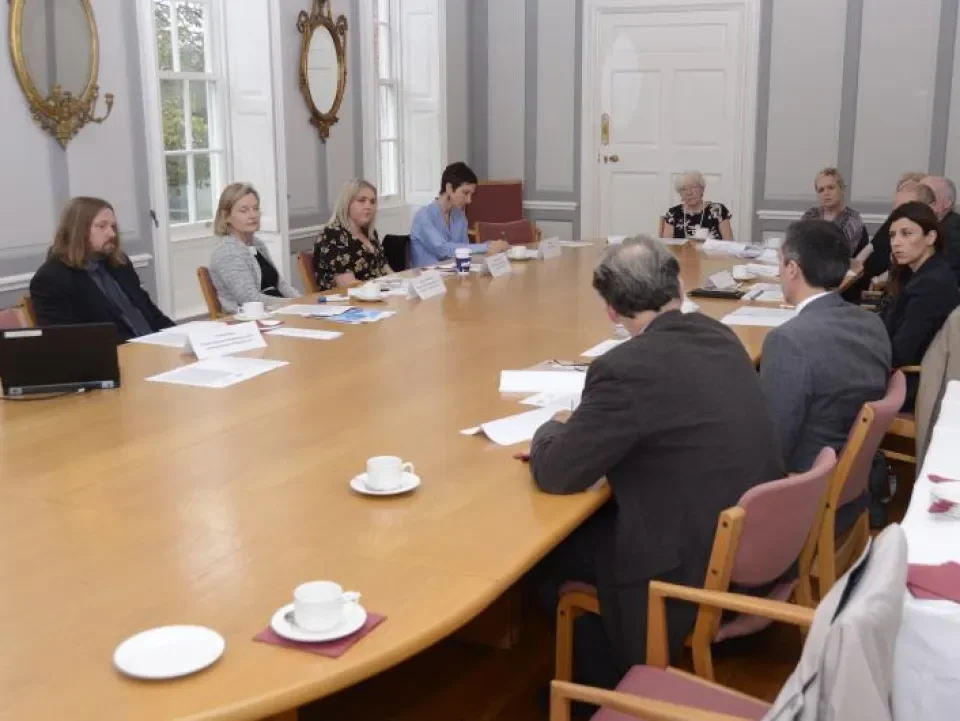
Roundtable 'One Stop Shop'
The Roundtable was attended by Minister Katherine Zappone, as well as by Claudio Masotti, Vice President, European Parents’ Association, Dr Paul Downes, Director EDC, Noel Kelly, Director, National Educational Welfare Services, Liz Waters, President, Aontas, The National Adult Learning Organisation, Professor Erna Nairz-Wirth, Head of Educational Sciences Group, Vienna University of Economics and Business, Paul Rogers, CEO Northside Area Partnership, Fiona Kearney, Familibase Services and Programme Coordinator, Ballyfermot, Dr Siobhan O'Reilly, Executive Director, Familibase, Ballyfermot, Sarah Murphy, Evaluator, Grangegorman Area Based Childhood Programme, Pat Courtney, Principal, St. Vincent’s BNS, Dublin 1 and Jennifer Plunkett, Principal, St. Benedict’s and St. Mary’s, Kilbarrack.
FAILINGS FORCE OUR PUPILS FROM SCHOOL: EU REPORT
Irish Daily Mail, September 21st 2017
Irish children are pulling out of school early because they don’t get the support they should , according to the author of a new E U-backed report on education needs, writes Sarah Slater. READ MORE
SCHOOLS ‘MUST PLAY A BIGGER ROLE IN TACKLING HUNGER, INADEQUATE SLEEP’
Irish Examiner, September 21st 2017
Issues such as tackling inadequate sleep and hunger need to play a bigger role in how Irish schools combat disadvantage, according to the author of a European Commission report, writes Niall Murray. READ MORE

DCU 20th Sept 2017
(L-R) Professor Erna Nairz-Wirth,Head of Educational Sciences Group; Claudio Masotti, Vice President European Parents' Association; Dr Paul Downes, Director EDC; Dr Katherine Zappone, Minister for Children and Youth Affairs; Professor Brian MacCraith, President DCU; Petra Goran, European Commission; Dr Irene Psifidou, Cedefop
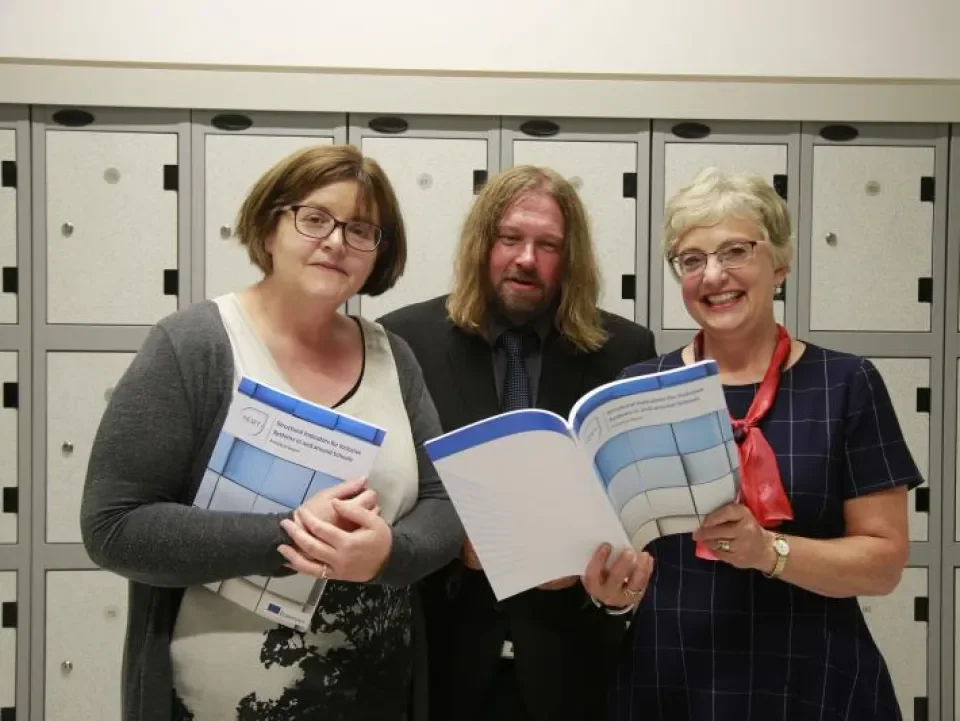
(L-R) Prof. Anne Looney, Dr Paul Downes and Minister Katherine Zappone
Paul Downes and Katherine Zappone pictured with Professor Anne Looney, Dean of Education, IoE, Dublin City University
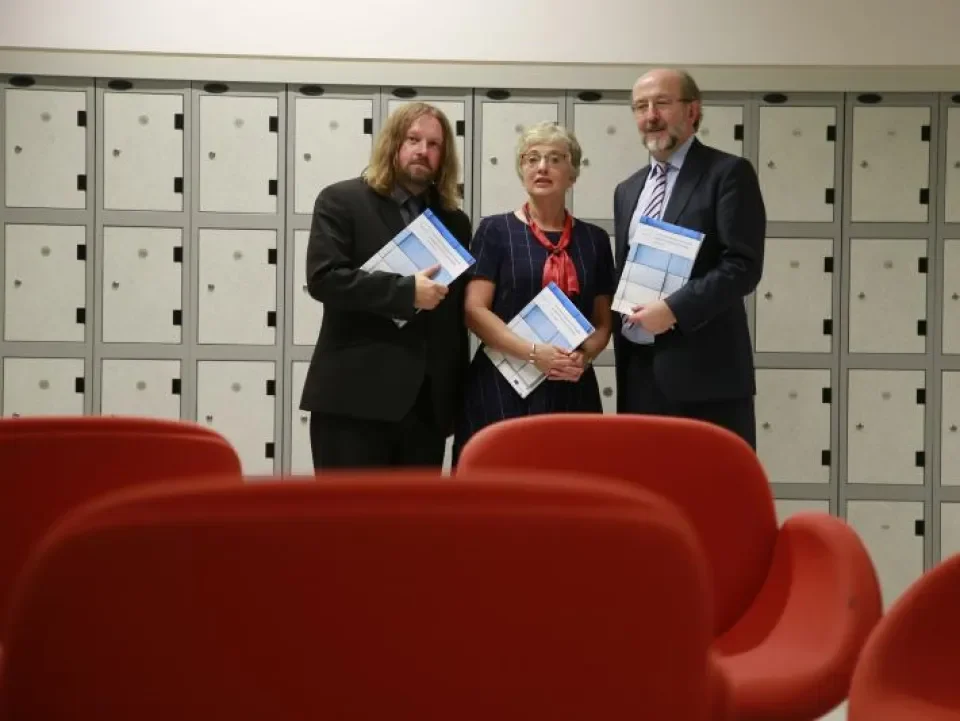
(L-R) Dr Paul Downes, Minister Katherine Zappone, Prof. Brian Mac Craith
